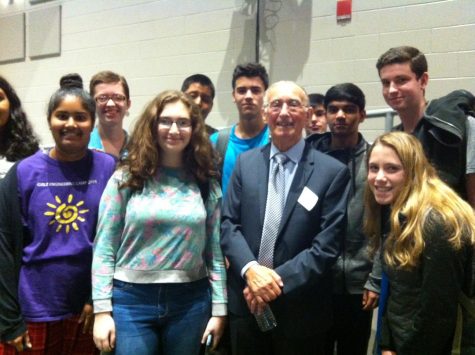Elmo takes on issues of parental addiction
Sesame Street’s Elmo and Karli, whose mother is in rehab for addiction, share a comforting hug.
Ever since its creation more than 50 years ago, “Sesame Street” has been continually expanding from its original cast. Most recently, on Oct. 9, Sesame Workshop, the non-profit organization behind “Sesame Street,” announced a new bilingual initiative called “Sesame Street in Communities.” The purpose of this initiative is to “support children and families affected by parental addiction” through Karli, a six year-old puppet in foster care whose mother was revealed to be in rehab for addiction.
So far, the initiative has produced shorts with Elmo’s dad clarifying that addiction is a sickness, Karli talking about the support groups she attends and Karli explaining that though she used to blame herself for her mother’s addiction, it was actually a “grown-up problem.” Karli has even given tips for other children in similarly distressing situations, such as talking to friends and taking deep breaths.
According to combined data from 2009 and 2014 surveys performed by the Substance Abuse and Mental Health Services Administration, an estimated 1 in 8 children (8.7 million) 17 years of age or younger have lived in households with at least one parent with a substance use disorder. According to the Administration for Children and Families, one-third of the children in foster care enter the system because of their parents’ addiction.
Looking at these statistics, it seems that Karli’s story has the potential to resonate with many children across the country. These children can identify with Karli, and are more likely to absorb messages and advice from beloved characters, who seem more like friends and equals, than those from adults and their parents.
For children unfamiliar with the idea of addiction, this initiative promotes an accurate and healthy understanding of pressing issues. “I think it’s really important because it’s like the real world, and children need to be exposed to that, so it doesn’t seem scary or out of the norm when they encounter that later,” junior Bianca Romano said.
Though this initiative may offer solidarity to some children and broaden the understanding of addiction for others, the extent to which the initiative has been reported on in the media sadly suggests Sesame Street may only be introducing these new characters for the publicity. “Sesame Street should not be making a really big deal about ‘look at us, we’re coming out with new characters who are really unique.’ I think if they were sort of subtly introducing these characters, it’d be a really cool thing to do,” sophomore Emily Wu said.
The impact of a parent’s addiction on younger children is traumatic, but often overlooked; so few resources are available to assist them in grappling with the issue. Regardless of their motivation, by introducing this initiative, “Sesame Street” has taken the essential first steps towards filling this void.
Your donation will support the student journalists of The Tide, Richard Montgomery High School's student newspaper. Your contribution will allow us to purchase equipment and cover our annual website hosting costs.

Lynna Deng began contributing to the Photography and Arts sections in her freshman year, and she is excited to be the assistant photo editor this year!...












